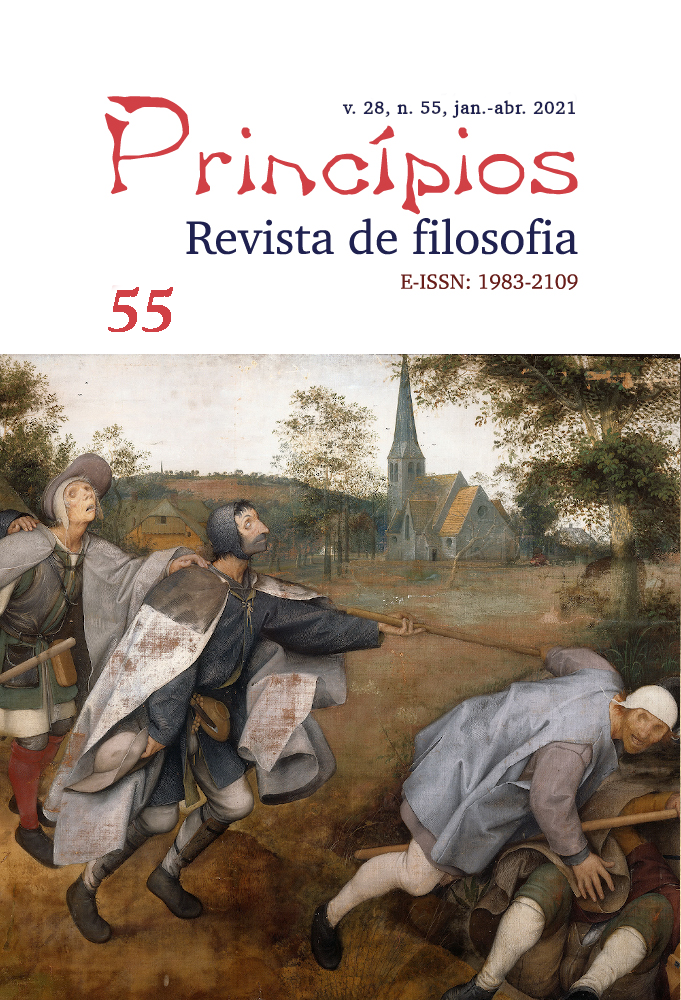A teoria dos dois sistemas de Kahneman
Uma crítica a partir da perspectiva ecológica gibsoniana
DOI:
https://doi.org/10.21680/1983-2109.2021v28n55ID22210Palavras-chave:
Percepção Direta, Affordance, Tomada de Decisão, Teoria dos Dois Sistemas, Teoria ecológica GibsonianaResumo
A Teoria dos Dois Sistemas, proposta por Kahneman (2011), pressupõe que a tomada de decisão no contexto econômico se baseia em dois sistemas, um que é automático, intuitivo e principalmente inconsciente e outro reflexivo, racional e totalmente consciente. Consideramos a abordagem kahnemaniana incompleta na medida em que a concepção dos sistemas 1 e 2 não é suficiente para explicar os processos de tomada de decisão. Neste artigo, nosso desafio é mostrar que, diferentemente dos sistemas de Kahneman, a tomada de decisão está ancorada na percepção direta de affordances e é a base das escolhas conceituais, que envolvem experiências sensório-motoras advindas da reciprocidade entre agente e ambiente. Concluímos este artigo, argumentando que, diferentemente da concepção de sistema 1 kahnemaniano, na perspectiva ecológica, a tomada de decisão advém de experiências não conceituais, da percepção direta, não automática, sem envolver representações mentais e processamento de informações.
Downloads
Referências
BARON, R. M. (2007) Situating Coordination and Cooperation Between Ecological and Social Psychology, Ecological Psychology, v. 19, n.2, 179-199, 2007.
BARRET, L. Beyond the brain: how Body and Environment Shape Animal and Human Minds. Princeton University Press, 2011.
BATESON, G. Mente e Natureza. Rio de Janeiro: F. Alves., 1986.
CARELLO, C.; MICHAELS, C. F. Direct perception. USA: Prentice-Hall, Englewood cliffs, 1981.
HEFT, H.The Social Constitution of Perceiver-Environment Reciprocity, Ecological Psychology, v. 19, n.2, 85-105, 2007.
GIBSON, J. J. The Ecological Approach to visual perception. New Jersey: Lawrence Earlbaum Associates, Inc., 1986.
GIBSON, E. J. Where is the information for affordances? Ecological Psychology, v.12, n.1, 53-56, 2000.
GIBSON, E. ONTOGENESIS of the perceived self. In U. Neisser (Ed.), The Perceived Self Ecological and Interpersonal Sources of Self Knowledge (Emory Symposia in Cognition, Cambridge: Cambridge University Press p. 25-42, 1994.
GONZALEZ, M.E.Q; MORAIS, S. R. A teoria da percepção/ação e o comportamento sócio-cultural. GONZALEZ, M.E.Q.; FERREIRA, A.; COELHO, J. (Orgs.). Encontro com as Ciências Cognitivas V. São Paulo: Cultura Acadêmica,1 49-161, 2007.
KAHEMAN, D.; TVERSKY, A. Prospect Theory: An Analysis of Decision under Risk. In: Econometrica, V. 47, N. 2, 263-292, 1979. Disponível em: https://www.its.caltech.edu/~camerer/Ec101/ProspectTheory.pdf . Acesso em: 6 dez. de 2019.
KAHNEMAN, D. Thinking fast and slow. New York: Farrar, Straus and Giroux, 2013. Disponível em: http://sysengr.engr.arizona.edu/OLLI/lousyDecisionMaking/KahnemanThinkingFast&Slow.pdf . Acesso em: 6 dez. de 2019.
LARGE, D. N. What is ecological philosophy? Disponível em: http://www.newphilsoc.org.uk/OldWeb1/Ecological/what_is_ecological_philosophy.htm Acesso em: 6 dez. de 2019.
LARGE, D. N. (2003). Ecological Philosophy. Web Version.Disponível em:https://revistas.pucsp.br › cognitio › article › downloadSuppFile Acesso em: 6 dez. de 2019.
MACE, W. James J. Gibson's Ecological Approach: Perceiving What Exists. Ethics and the Environment, v. 10, n.2, 195-216, 2005. Disponível em: https://commons.trincoll.edu/wmace/files/2016/07/Enviro_chapt.pdf Acesso em: 6 dez. de 2019.
MOREWEDGE, C. K., KAHNEMAN, D. Associative Processes in Intuitive Judgment. In Trends in Cognitive Sciences, v. 14, n. 10, 435–440, 2010. Disponível em: http://people.uncw.edu/tothj/PSY510/Morewedge-Intuitive%20Judgment-TiCS-2010.pdf Acesso em: 6 dez. de 2019.
MORONI , J. Uma reflexão filosófica sobre o conceito de informação ecológica. 2012. 105 f. Dissertação (mestrado) - Universidade Estadual Paulista, Faculdade de Filosofia e Ciências de Marília, 2012. Disponível em: https://repositorio.unesp.br/handle/11449/91764 Acesso em: 12 dez. de 2019.
MORONI, J. Um estudo epistemológico do Self não conceitual no contexto informacional da Filosofia Ecológica. 2016. 185f. Tese (Doutorado) - Universidade do Estado do Rio de Janeiro. Instituto de Filosofia e Ciências Humanas. Disponível em: https://www.academia.edu/36677325/Tese_de_doutorado_Um_estudo_epistemol%C3%B3gico_do_Self_n%C3%A3o_conceitual_no_contexto_informacional_da_Filosofia_Ecol%C3%B3gica Acesso em: 12 dez. de 2019.
MORONI, J. SELF e conteúdo não conceitual da percepção: a perspectiva anti-representacionista acerca da experiência perceptiva do reconhecimento de lugar. In: Griot: Revista de Filosofia, Amargosa, Bahia, v.16, n.2, p. 285-302, 2017. Available from: https://www3.ufrb.edu.br/seer/index.php/griot/article/view/765 . Acesso em: 31dez. de 2019.
REED, E. S. The intention to use a specific affordance: a frameworkfor psychology. In R. Wozniak, & K. Fisscher (Eds.), Development in context: Acting and thinking in specific environment. Hillsdale, NJ: Lawrence Erlbaum Associates, p. 45-75, 1993.
REED, E. S. Encountering the world. New York: Oxford University Press, 1996.
SCHMIDT, R. C. Scaffolds for social meaning. In Ecological Psychology, v. 19, n. 2, p. 137 151, 2007.
SIMON, A. H.What is an "explanation" of behavior? In: Psychological Science, V. 3, N. 3, MAY 1992. Disponível em: http://web.csulb.edu/~cwallis/382/readings/482/simon%20What%20is.pdf. Acesso em: 17 dez. de 2019.
TVERSKY, A., KAHEMAN, D. Advances in Prospect Theory: Cumulative Representation of Uncertainty. J Risk Uncertainty v. 5, p. 297–323, 1992. Disponível em: http://cemi.ehess.fr/docannexe/file/2780/tversjy_kahneman_advances.pdf. Acesso em: 6 de dez. de 2019.
WITHAGEN, R.; DE POEL, H. J.; ARAÚJO, D.; PEPPING, G-J. Affordances can invite behavior: reconsidering the relationship betweeen affordances and agency. In: New Ideas in Psychology, Elsevier, p. 250-258, 2012. Disponível em: http://www.academia.edu/1209074/Affordances_can_invite_behavior_Reconsidering_the_relationship_between_affordances_and_agency Acesso em: 31 dez. de 2019.
ZHU, Y.; RITTER, S. M.; MÜLLER, B. C.N.; Dijksterhuis, Ap. Creativity: Intuitive processing outperforms deliberative processing in creative idea selection. In: Journal of experimental social psychology, V. 73,p. 180-188, 2017. Disponível em: https://repository.ubn.ru.nl/bitstream/handle/2066/175700/175700pre.pdf?sequence=2. Acesso em: 31 dez. de 2019.
Downloads
Publicado
Como Citar
Edição
Seção
Licença
Autores mantêm os direitos autorais e concedem à revista o direito de primeira publicação, com o trabalho simultaneamente licenciado sob a Licença Creative Commons Attribution que permite o compartilhamento do trabalho com reconhecimento da autoria e publicação inicial nesta revista.
Termos da licença:
| Não Comercial (NC) | Os licenciados podem copiar, distribuir, exibir e executar a obra e fazer trabalhos derivados dela, desde que sejam para fins não comerciais. |
| Compartilha Igual (SA) | Os licenciados devem distribuir obras derivadas somente sob uma licença idêntica à que governa a obra original ou menos restritiva. |


 Português (Brasil)
Português (Brasil) English
English Español (España)
Español (España) Français (Canada)
Français (Canada)


